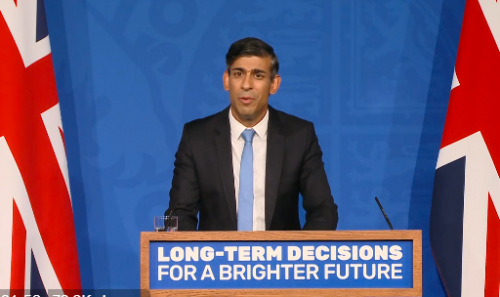Net zero U-turn met with derision from business leaders and unions

Prime Minister Rishi Sunak’s plan to substantially water down the UK’s commitment to become net zero has been met with a hail of criticism from business leaders, environmentalists and academics.
In a keynote speech yesterday (September 20), Sunak said he pushing back the ban on new cars using solely petrol and diesel from 2030 until 2035, loosening plans to phase out gas boilers from 2035, delaying the ban on boilers that rely on oil from 2026 to 2035 and scrapping entirely the energy efficiency upgrades to homes – in a move that will be seen as a boost to landlords.
He said: “We’re changing the way we reach net zero by 2050 to ease the burden on working people. Our new approach will be pragmatic, proportionate and realistic.”
But at an East Midlands Chamber sustainability event yesterday, the government was accused of “shifting the goalposts” on net zero policy.
East Midlands Chamber director of policy and insight Chris Hobson said: “We heard at our Sustainability Summit about some of the great things that businesses are doing in pursuing green growth and the very tangible rewards they are reaping with innovation and financial growth.
“These are the shining examples of success we can glean from embracing net zero, which means viewing it as not just a challenge but a golden opportunity.
“Yet while our national leaders correctly talk up the research and development strengths of our businesses and ambitions to be a global leader in developing low-carbon goods and services, there is a huge disconnect between this messaging and Government policy – as evidenced by the Prime Minister’s ill-judged shifting of the goalposts on our country’s net zero commitments.
“We saw first-hand the impact policy flip-flopping has on business decision-making during the chaotic political landscape of 2022, which quashed business confidence and thus investment. The lack of certainty about the future direction of our economy will unfortunately have a similar impact at a time when we should be encouraging transformational long-term investment.
“Having net zero targets is one thing, but to get us there we require a roadmap that will be led by business innovation. The vacillating from our political leaders instead undermines our ability to make real progress in this space and we instead find ourselves stuck in limbo when it comes to the most significant economic opportunity of our lifetime.”
Transport and travel union TSSA has warned the government is “heading down a climate cul de sac” after Sunak announced “a new approach” to tackling climate change.
The remarks come just days after questions in the Commons in response to reports that the government plans to scrap the High Speed 2 (HS2) rail line beyond Birmingham, to Manchester – a key green mass transport project.
TSSA interim general secretary Peter Pendle said: “What we have heard from the Prime Minister is a dereliction of duty which sends our country down a climate cul de sac.
“Rishi Sunak has no mandate to turn away from existing climate change obligations. If he wishes to press ahead with such major changes he should have the guts to call a general election so the public has a proper say.
“Our union fights every day to help secure Britain’s transition to net zero. Our railways are at the forefront of that change as the most important mass green transport system.
“If Sunak is serious he would give a clear commitment that HS2 will be built in full. That would be a major step forward down the road to net zero.”
And not even all organisations representing landlords have welcomed the changes.
Jonathan Daines, Founder and CEO, lettingaproperty.com said: “While welcome news for some, the Government’s U-turn on introducing new energy efficiency regulations on homes is frustrating for our landlord clients, many of whom have already taken steps to ‘do the right thing’ in preparation for change.
“With the planned EPC changes looming, many landlords in our community proactively improved the energy efficiency of their properties. They incurred significant costs and practical hassles, to make energy efficiency upgrades in line with proposed EPC minimums.
“Some of our landlords even took the drastic step of selling their property because it was financially or practically impossible to make necessary improvements. These landlords have walked away from the Private Rented Sector and a ripple effect has been felt, with tenants competing within a shrinking pool of homes to rent. Those lucky enough to secure a rental are typically paying more for the privilege, thanks to reduced stock levels – an unwelcome burden on top of rising living costs.
“Letting agents too have felt the pain of Government indecision. With many landlords choosing to exit the market, potential customer numbers have decreased, leading to increased competition combined with rising acquisition and retention costs.
“Amid the chaos, we mustn’t lose site of the positive purpose behind making energy efficiency improvements and creating greener homes to support the wider commitment to net zero. It is imperative however that policymakers provide clarity and consistency in their approach to rental property regulations. The Government’s wavering stance has ultimately betrayed landlords and tenants, while negatively impacting businesses who rely on a stable and thriving rental market.”









